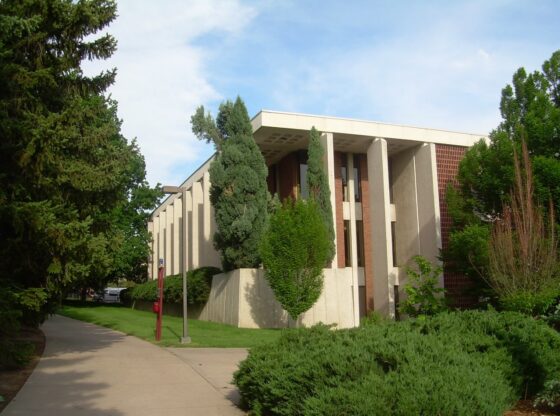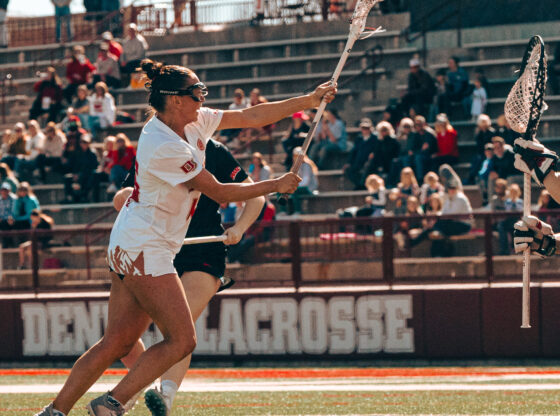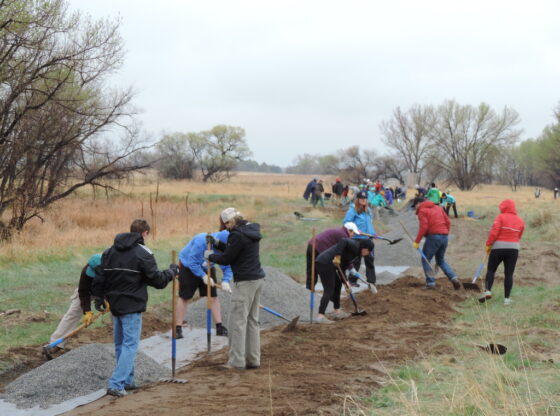“No foods are forbidden,” advises Nancy Pudwill, a University of Denver dietician. “As long as they’re a part of your total, they’re okay. Eating fat doesn’t make you fat.”
Pudwill spoke last week at “Avoid the Freshman 15 & Eat Your Pizza, Too!,” an educational event sponsored by the DU Student Health and Counseling Center.
The two-hour seminar focused on diet, exercise and the role of sports and altitude on student health.
It’s very difficult to eat healthily in this society, Pudwill said. “We tend to supersize things. Portion sizes are unrealistic.” Eating when not hungry is another problem.
“Eating when you’re studying, as a way to break up the time, makes it difficult to keep track of what you’re eating. You need to pay attention to when you’re hungry,” she said.
Matt Gohl, the general manager of the Coors Fitness Center, spoke about opportunities to participate in club and intramural sports, as well as fitness classes.
“The Fitness Center really is a place where you can unleash your potential, mind, body and soul,” Gohl said, in reference to the Ritchie Center Student Guide’s motto.
He encouraged students to participate as much as they can and to contact him at the center if they wished to start new club or intramural sports.
Michael Smith, a fitness trainer at the fitness center, spoke about how to exercise efficiently.
“You want to do cardio at around 60 percent of your heart rate,” Smith said.
Your target heart rate is derived from your maximum heart rate (220 minus age) and your resting heart rate, which Smith suggests checking as soon as you wake up in the morning.
According to Smith, your target heart rate can be found easily using this formula: [((220-age)-RHR) x 0.6] + RHR.
“Above 65 percent, you start burning glucose, blood sugar,” he said, continuing to show how burning glucose can ultimately lead to weight gain.
“You should do cardio for 20-40 minutes max, five or six times a week,” Smith advised. “More than that and you’re only decreasing how effective your workout is, and you’re putting yourself at risk for injuries.”
Finishing off the seminar was a presentation on high altitude illness by Girish Paranjape, a physician with the Health Center.
He advised against ascending too rapidly, drinking caffeine or alcohol while at high altitude, and not drinking enough water.
“Eat food high in carbs as a preventative measure,” Paranjape recommended, “Pay attention to your body.”
Headache, difficulty breathing, difficulty sleeping and nausea are all indicators of altitude illness.
As some types of altitude sickness can be fatal, it’s important to seek treatment immediately if you suspect you or a friend has high altitude illness.
Paranjape also warned the audience about sun injury and cold injuries. “Wear UV-protectant glasses and rewarm frequently,” he urged.
————————————————————————————
Tips on eating right
– Follow the food pyramid.
– Eat the correct portion size. For most foods, it is about a half-cup or the size of a deck of cards.
– Drink water. A good rule of thumb is to drink an ounce of water each day for every two pounds of body weight.
– Eat slowly. It takes the brain about 20 minutes to register a full stomach. Take your time and enjoy your meal.
– Don’t eat out of packages. Put a portion in a bowl or on a plate so you know how much you’ve eaten.
– When you eat out, you should have leftovers. Box them up and eat them later.
– Eat every five hours or so if you are a meat-eater, and every three to four hours if you are a vegetarian and don’t consume fatty proteins.
– Don’t avoid fat! “Fat helps your meal stick. You’ll feel fuller longer if you eat a little fat with your protein,” said Nancy Pudwill, DU dietician.












